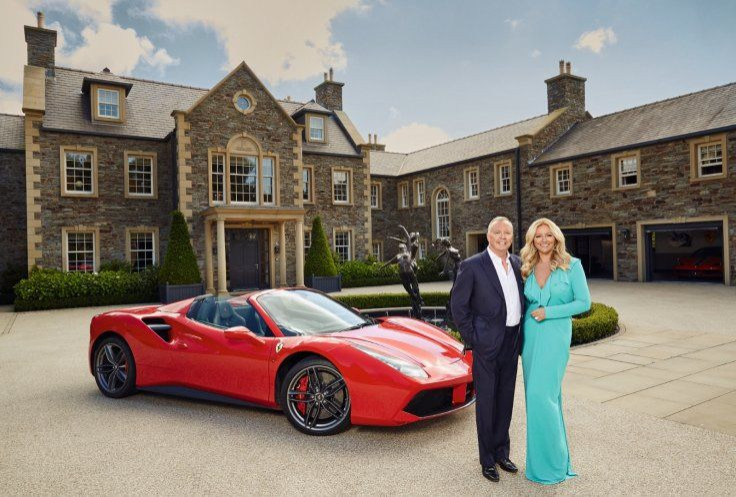Ways To Spend Your Cryptocurrency Gains

Albert Oliver, the founder of concierge services provider One Hundred (it's limited to 100 clients), says that about 30 percent of his wealthy clientele have made money from holding cryptocurrency. However, he has encountered a problem, as have his clients, should they decide they want to cash out their digital gains: No bank will touch large amounts of cash exchanged for cryptocurrency.
"These people are typically early adopters, with a few investments in stock and shares and some other bits and pieces, who fancied a punt on Bitcoin," he said. "They may have stuck a few thousand in and even forgotten about it."

"We've got clients that are British citizens with U.K. bank accounts, with money stuck in Kraken or somewhere like that, and then want to bring it back into a U.K. bank account. But the banks are like, 'We're not touching it.'"
This has meant exploring banks in other jurisdictions, and generally feeling like money launderers, despite having done nothing wrong. "One client wants to use the million pounds he's made to buy a house," said Oliver, "but he can't get his money out."
Perhaps his client would be interested in a new, luxury property opportunity, open to holders of Bitcoin, being launched September 6.
Baroness Michelle Mone of Mayfair OBE and her business (and life) partner Doug Barrowman, the chairman of the Knox Group of Companies, have unveiled a luxury apartment complex called Aston Plaza in the heart of Dubai. You can buy one of these apartments directly with your Bitcoin, facilitated by BitPay, the well-known Bitcoin payments processor.
The $325 million development includes a large shopping mall and spans over 2.4 million square feet, split across two 40-story residential towers, containing 1,133 apartments.
Michelle Mone Interiors, another new venture, has handled much of the design, and Bitcoin can also be used to select a tailor-made interior package. Studio apartments will start in price from around 30 BTC, said a statement.
"Apartments have been sold before using Bitcoin, I believe, but there's never been a development on this sort of scale – £250million sold using Bitcoin. It's very exciting," Baroness Mone said.
Barrowman, who has been investing in cryptocurrency and tokens for the past two years, said: "People are sitting on large gains that have been made in the crypto world over the last few years. So it's a great opportunity to turn it into a physical asset."
BitPay converts Bitcoins to U.S. dollars that are then transferred to the property development company in Dubai and held in an escrow account until completion. In terms of tax, there is a 4 percent land registry fee payable on purchase, said Barrowman.
"We have a dollar value for each of these apartments (dollars are pegged to Dubai dirhams, so it all fits in beautifully) and on the day on which they purchase it, we look at where Bitcoin is. BitPay will take care of the transactional side of it, but essentially the process in Dubai will be a conventional conveyancing process."
According to Coindesk's State of the Blockchain report, assets like real estate are returning about 9 percent, while cryptocurencies and tokens average at about 450 percent, suggesting you'd have to be mad to diversify.
Baroness Mone rightly pointed out that the crypto world is very volatile; the recent ICO ban from China wiped billions off the value of cryptocurrency tokens, for example. "I think if you buy one of these apartments it's something you can touch, something you can have," she said. "We see big swings on a daily basis and who knows what might happen to Bitcoin in the future; no one quite knows. So this is an opportunity to put it into a hard backed asset."
A recent report by a Transparency International pointed out that buying property in places like London is a favorite way to launder squillions of dirty dollars. Given the perception around Bitcoin, this would seem to wave a rather large anti-money laundering (AML) flag.
On the subject of regulation, Barrowman pointed out that while Bitcoin is currently unregulated in most parts of the world, it's only really pseudonymous and actually leaves an indelible audit trail. "The reality is we are in an evolving world when it comes to cryptocurrency regulation. I think in three years' time it will be more heavily regulated," he said.
"The Isle of Man has the Designated Business Act so you have to know your client [KYC], source of funds, AML laws and that's only going to increase."

Timo Dijkstra, compliance director at BitPay has handled AML and KYC on large Bitcoin purchase transactions in the past, including boats and the occasional holiday home in Lake Tahoe.
He said that in terms of KYC, BitPay's primary role is to check out the merchant, Knox Group in this case. "We perform the due diligence on them. We make sure that we know that customer; that we know they have a good process in place; that they are dealing with all the legal and compliance aspects of their business," Dijkstra said.
"The other counterparty risk is really the responsibility of the merchant because it's their customer. But we also check that regularly. So when a high transaction goes through, we check the KYC documents for that transaction and ask what other checks were done. We look at the purpose of this transaction and what was the source of the funds.
"That's the traditional side. But with Bitcoin every transaction is recorded on a public ledger so everybody can see it. So we use blockchain analysis to make sure the incoming transaction is not linked in any way to nefarious sources, such as dark markets or related to ransomware for example," said Dijkstra.
"So that's the check we can do on our end to make sure that when someone is buying a house they didn't make that money with selling illegal goods or something like that."
Pawel Kuskowsk, iCEO of Coinfirm, which specializes in crypto compliance and analytics, echoed this, pointing out that because Bitcoin is decentralized and you don't have a bank in the middle, you carry the peer-to-peer risk exposure.
"So it's one party's job to understand who the counterparty is. The second part is, what is the risk associated with the source of funds.
"Maybe you do a check and it appears to be some person, an individual, who maybe bought some Bitcoin years ago and forgot about it, or didn't expect the value to go up so high, and now they want to buy a house. But in reality they have just hacked an exchange, or maybe it's not an individual at all, but money coming from ransomware."
Kuskowski said that while most cryptocurrency holders are legitimate businesses, out of every ten crypto transactions, about one will have come from questionable sources. He said there are about 200 different red flags in his system highlighting risky sources and exposures.
"If you want to accept new ways of payment, you need to manage the risk associated. There is no way you can cut the corners here. But there are tools out there; it's not rocket science."
Another approach to KYC is simply ensuring you know your customers really well. This is the approach being taken by Eleesa Dadiani, owner of Dadiani Fine Art Gallery in London, who recently started accepting cryptocurrencies to pay for art.

Now she is about to launch Dadiani Syndicate, which will provide a whole range of very high luxury products that can be bought with crypto, including central London property, supercars, diamonds and bloodstocks.
Regarding KYC for her new venture, Dadiani said: "These people are not strangers. I need to know my clients personally. This is a really hyper-personalised service; it's a small line-up, definitely not an ecommerce site."
Dadiani is travelling to places like Singapore and China, in part to educate her clients about cryptocurrency, new tokens and the technology that underpins various use cases. She said there has been quite a bit of interest from her network of contacts in the U.S. and India; initially, she was targeting Russia.
She said: "We are the first platform in the U.K. that will trade bloodstock in cryptocurrency. The particular bloodstock fund I work with enjoys 40 percent returns; it's a very unusual structure they have got there. It's a passion investment as well as a practical one. Maybe in time we can convince some of our dealers to accept crypto and sit on it."
This perhaps touches on an obstacle facing any business offering people the chance convert their cryptocurrency into other assets. Because even in a crashing crypto bear market – what do you do? Those familiar with the expression 'I AM HODLING' know there's only one answer to that question.

© Copyright IBTimes 2024. All rights reserved.




















